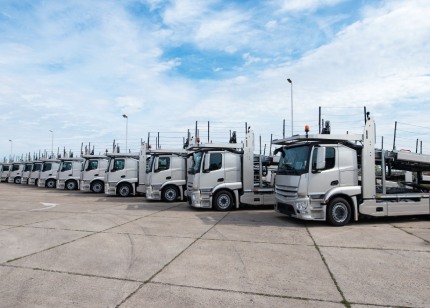-
In the dynamic landscape of transportation and logistics, fleet management faces numerous challenges, from ensuring the security of assets to optimizing operational efficiency. Blockchain technology has emerged as a transformative solution, offering transparency, security, and efficiency to the intricate processes of fleet management. In this comprehensive blog, we'll explore the various ways in which blockchain is reshaping the future of fleet management. To develop a blockchain-based fleet management solution, opting for trusted blockchain development services is a must.
Understanding Fleet Management
Fleet management involves the coordination, maintenance, and supervision of a company's vehicles, whether it be trucks, cars, or other types of transportation assets. The challenges inherent in this field include ensuring the safety of drivers, optimizing routes, monitoring fuel consumption, and maintaining compliance with regulations.
The Role of Blockchain in Fleet Management
Enhanced Transparency
Blockchain's decentralized and transparent nature provides a secure and immutable ledger that records every transaction and event related to fleet operations. This transparency helps in reducing disputes, fraud, and errors in the system.
Immutable Recordkeeping
Each transaction or event, such as maintenance records, fueling, and repair history, is recorded in a secure and tamper-resistant manner on the blockchain. This ensures a reliable and auditable record of the entire lifecycle of each vehicle.
Smart Contracts for Automation
Smart contracts, self-executing contracts with the terms of the agreement directly written into code, can automate various processes within fleet management. For instance, they can automatically trigger maintenance schedules, payments, or alerts for scheduled inspections.
Also, Check | Smart Contract Development Services
Real-Time Tracking and Monitoring
Blockchain enables real-time tracking of vehicles through the integration of IoT (Internet of Things) devices. This facilitates precise monitoring of routes, fuel consumption, and the condition of the vehicles, allowing for better decision-making.
Supply Chain Integration
By integrating blockchain into the supply chain, fleet management can gain a comprehensive view of the entire logistics process. This includes tracking the movement of goods, verifying the origin and authenticity of products, and ensuring compliance with regulations.
Data Security and Privacy
Blockchain's cryptographic features ensure the security and privacy of sensitive data. Access to information can be permissioned, and data is encrypted, reducing the risk of unauthorized access and data breaches.
Streamlined Maintenance Processes
The transparent and verifiable nature of blockchain records simplifies the maintenance process. Automated maintenance schedules, recorded on the blockchain, ensure that vehicles are serviced promptly, reducing the likelihood of breakdowns and improving overall reliability.
Immutable Compliance Records
Compliance with regulations is critical in fleet management. Blockchain maintains immutable records of compliance-related activities, making it easier to demonstrate adherence to industry regulations during audits.
Also, Explore | Blockchain in Supply Chain | Use Cases, Advantages, and Features
Challenges and Considerations
Integration Complexity
Integrating blockchain into existing fleet management systems may pose challenges. Companies need to carefully plan and execute the integration process to ensure a seamless transition.
Scalability
As the number of vehicles and transactions increases, scalability becomes a concern. Choosing a blockchain solution that can scale to meet the growing demands of fleet operations is essential.
Standardization
Achieving industry-wide standardization for blockchain implementation in fleet management is a challenge. Collaboration between stakeholders is necessary to establish common protocols and standards.
Also, Read | Reimagining Supply Chain Management with NFTs
Conclusion
Blockchain technology is ushering in a new era for fleet management, providing a decentralized, transparent, and secure framework for optimizing operations. From real-time tracking to automated maintenance schedules, the applications of blockchain in fleet management are diverse and impactful. As the technology continues to mature, companies in the transportation and logistics sector can leverage blockchain to gain a competitive edge, enhance operational efficiency, and navigate the complexities of the modern fleet management landscape. If you are interested in exploring more about using blockchain for fleet management, connect with our blockchain developers to get started.

Our Offices
INDIA
Emaar Digital Greens, Sector 61,
Gurugram, Haryana
122011.
Welldone Tech Park,
Sector 48, Sohna road,
Gurugram, Haryana
122018.















